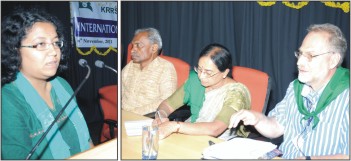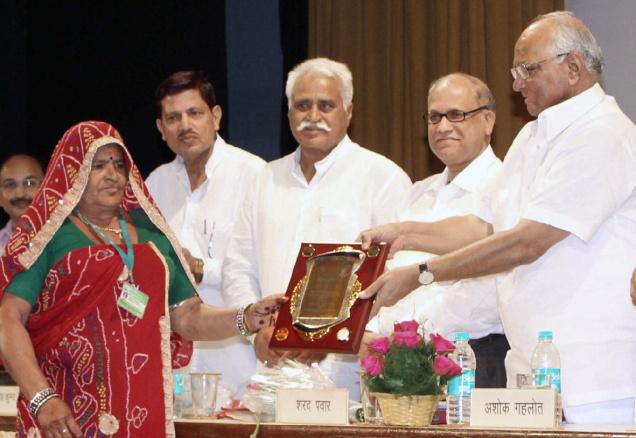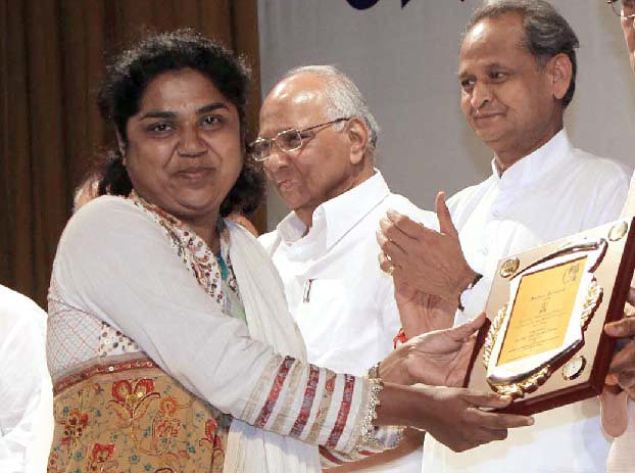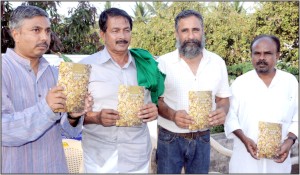Intl. seminar on zero-budget farming by La Via Campesina
Caption: KRRS General Secretary Chukki Nanjundaswamy speaking at the seminar on natural farming held in city this morning. Picture right shows the pioneer of zero-budget farming Subhash Palekar, Nandini Jairam and Peter Rosset of La Via Campesina on the dais.
Mysore:
An international seminar on self-sustainable, zero-budget natural farming, propounded by international organisation La Via Campesina, was held under the aegis of Karnataka Rajya Raitha Sangha (KRRS) at Rani Bahadur auditorium in B.N. Bahaddur Institute here this morning.
Speaking on the occasion, Subhash Palekar, popularly known as Krishi Rishi, an exponent of natural farming and promoter of the concept of Zero Budget Natural Farming (ZBNF), said that the State Government’s Organic Farming Mission must be closed as it is against the interests of farmers and favours multinationals. He urged the government not to confuse the farmers between natural farming, organic farming and the conventional method of farming.
Pointing out the drought prevailing in north Karnataka region and the continued spells of rain in southern region of the State even during November, Palekar said that it was due to changes in the environment which if unchecked, would lead to disastrous implications.
KRRS General Secretary Chukki Nanjundaswamy, delivering the inaugural address, expressed regret that those in power were least bothered about the farmers resorting to suicide throughout the nation and said that there was a need for authorities to contemplate on why the farmers became entangled in debts and how to bail the Annadatha out of the severe financial constraints which force them to take the extreme step.
Deploring the conventional method of farming, she said that it required huge investments by way of seeds (from company brands claiming to be of superior quality and high-yielding), chemical fertilisers, weedicides, insecticides etc., but fetched no profit either because of crop failure due to vagaries of nature or crash in prices caused by over-production or other reasons.
Chukki termed the State Government’s Organic Farming Mission as capitalist agriculture and called upon farmers to take up pro-farmer agri-practices.
Peter Rosset, a member of La Via Campesina, addressing the gathering, said that the agri-scientists who work within the labs lack first hand experience of farming in the field and hence, their research works go waste.
They need to be practical, keeping in mind the farmers’ limitations and must ensure that their research works reach the farmers and properly implemented. He also deplored the use of hybrids and advocated for natural farming using original breeds. He also spoke in favour of polyculture (mixed farming).
KRRS President K.S. Puttannaiah, Nandini Jairam and farmer delegates from Sri Lanka, Indonesia, Combodia, Scotland, Philippines, Mexico, Korea, Nigeria and Nepal were present.
Natural Farming: It needs no tilling, no fertilisers, no pesticides and no weeding. For about 60 years, Fukuoka Masanobu, Japan’s authority on natural farming, honed methods based on his theories. His book One-Straw Revolution addresses not only natural farming but also causes of environmental deterioration.
Intl. campaign for natural farming
Via Campesina is an international movement which co-ordinates farmers’ organisations of small and middle-scale producers, farm workers, rural women, and indi-genous communities from Asia, Africa, America and Europe.
It is a coalition of over 148 organisations, advocating family-farm-based sustainable agriculture and was the group that first coined the term “food sovereignty” which refers to the right to produce food on one’s own territory. Via Campesina has carried out a Global Campaign for Agrarian Reform since 1999.
Organised worldwide into nine regions, the group has members in 69 countries, with about 150 million members globally. The organisation was founded in 1993 by farmers’ organisations from Europe and Latin America. Its headquarters is in Jakarta, Indonesia. Henry Saragih is the General Secretary.
source: http://www.starofmysore.com / General News / November 06th, 2011





 Miss India World Manasvi Mamgai and Miss India International Neha Hinge in Nadi last week.
Miss India World Manasvi Mamgai and Miss India International Neha Hinge in Nadi last week.
 FIRST TIME IN INDIA
FIRST TIME IN INDIA
 Murthy’s environmental concern does not stop at the office parking lot. He makes sure that printing paper used in the office are printed on both sides and lights are switched off when not needed. “The printing cartridge and electric waste are not bio-degradable. I am rude with people who waste paper, power and petrol. As individuals, we can do what is possible at our level to protect whatever is left of the environment,” said the Electronics and Communications engineer.
Murthy’s environmental concern does not stop at the office parking lot. He makes sure that printing paper used in the office are printed on both sides and lights are switched off when not needed. “The printing cartridge and electric waste are not bio-degradable. I am rude with people who waste paper, power and petrol. As individuals, we can do what is possible at our level to protect whatever is left of the environment,” said the Electronics and Communications engineer.